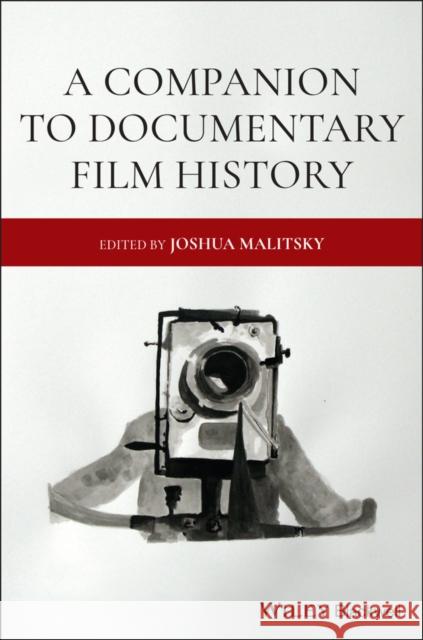Companion to Docum Film Histor » książka



Companion to Docum Film Histor
ISBN-13: 9781119116240 / Angielski / Twarda / 2021 / 544 str.
Companion to Docum Film Histor
ISBN-13: 9781119116240 / Angielski / Twarda / 2021 / 544 str.
(netto: 780,44 VAT: 5%)
Najniższa cena z 30 dni: 807,79
ok. 30 dni roboczych.
Darmowa dostawa!
A Companion to Documentary Film History asks us to reflect on the ways we write histories of and through documentary. Consisting of 20 original essays by the field's leading scholars, the volume is critically reflexive and highly informative. Attending to both established approaches and theoretically-informed methodological shifts, this fabulous book is sure to become a touchstone for the field. --Charles Musser, Yale UniversityThe book's rather dry title could well read, "Generative Perspectives on Documentary Film History." That is, anyone interested in non-fiction media, especially scholars in related areas, will find exciting new ways to think about the media they use, write about, and perhaps make. One of the book's major delights is its precise summary of so much scholarship about documentary, and in a broader sense about facticity itself. An epistemological treat. --Julia Lesage, University of OregonJoshua Malitsky's A Companion to Documentary Film History is a remarkable achievement. Together with his four section editors, Malitsky has compiled a book which covers all key aspects of documentary history, from early cinema to the Arab spring and from Europe to the Americas, Africa and Asia. The result is an introduction which is comprehensive in scope and penetrating in depth. At the same time, it is an anthology of the best work currently available on the subject - a real pleasure to read. -- Vinzenz Hediger, professor of cinema studies, Goethe Universität Frankfurt am Main"An utterly dynamic approach to the most necessary, engaged, and impactful form of cinema we have. These essays cast documentary history as aesthetically charged, politically crucial, and culturally vivid, showing us that so-called non-fiction films have persistently reshaped everyday, institutional, and exceptional spaces. They have animated local and global networks, crosspollinated with art movements and new technologies, charging film makers and film viewers alike with the imperatives to see, listen, think, feel, and act. This book captures these energies and presents them here in lucid, compelling prose." --Haidee Wasson, Concordia University
Documentary Borders and GeographiesTheme Editor, Alice LovejoyContributors:1. Martin Johnson, "A Distant Local View: The Small Town Film and U.S. Cultural Diplomacy and Occupation, 1942-1952"2. Paul Fileri, "The Work of Displacement in Colonial Documentary: History, Movement, and Collectivity Between the Postwar Metropole and Colonial French West Africa"3. Naoki Yamamoto, "Negation of the Negation: Tracking Documentary Film Theory in Japan"4. Raisa Sidenova, "The Topographical Aesthetic in Late Stalinist Documentary Film"Authors and Authoring AgenciesTheme Editor, James CahillContributors:1. Zoe Druick, "Documentality: The Postwar Mental Health Film and the Database Logic of the Government Film Agency"2. Josh Neves, "Unmanned Capture: Automatic Cameras and Lifeless Subjects in Contemporary Documentary"3. Brian Jacobson, "Corporate Authorship: French Industrial Culture and the Culture of French Industry"4. Alla Gadassik, , "A Skillful Isis: Esfir Shub and the Documentarian as Caretaker"5. Philip Rosen, "Now and Then: On the Documentary Regime, Vertov, and History"Films and Film MovementsTheme Editor, Joshua MalitskyContributors:1. Jane Gaines, "Documentary Dreams of Activism and the 'Arab Spring'"2. Luca Caminati, "A Culture of Reality: Neorealism, Narrative Non-Fiction, and Roberto Rossellini (1930s/1960s)" and translation of Alberto Cavalcanti, "Propaganda Documentaries"3. Thomas Waugh, "The Romantic Becomes Dialectic?: Joris Ivens, Cold Warrior and Socialist Realist, 1946-1956"Media ArchaeologiesTheme Editor, Malte HagenerContributors:1. Steven Jacobs, "A Concise History and Theory of Documentaries on the Visual Arts"2. Weihang Bao, "Documentary in the Age of Mass Mobility: Minzu wansui and the Epic Gesture of Ethnographic Propaganda"3. Oliver Gaycken, "Documentary Plasticity: Embryology and the Moving Image"4. Yvonne Zimmermann, "Hans Richter and the Filmessay: A Media Archaeological Case Study of Documentary Film History and Historiography"Audiences and CirculationTheme Editor, Brian WinstonContributors:1. Greg Waller, "Non-Fiction Film in and out of the Moving Picture Theater: Roosevelt in Africa (1910)"2. Brian Winston, "The Marginal Spectator"3. Mariano Mestman, "'Every spectator is either a coward or a traitor': Watching The Hour of the Furnaces"4. William Uricchio, "From Media Effects to the Empathy Machine: The Nature of the Audience and the Persistence of Wishful Thinking"
Joshua Malitsky is Associate Professor of Cinema and Media Studies and Director of the Center for Documentary Research and Practice at Indiana University. He works on a range of topics related to documentary and other nonfiction media genres and has published a number of articles on documentary history and theory including topics such as the relationship between documentary and nation-building, documentary and science, documentary studies and linguistic anthropology, and the sports documentary. He is the author of Post-Revolution Non-Fiction Film: Building the Soviet and Cuban Nations.
1997-2026 DolnySlask.com Agencja Internetowa
KrainaKsiazek.PL - Księgarnia Internetowa









